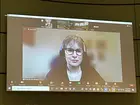
Energy for All: Richenda Van Leeuwen on Effective Approaches for Expanding Sustainable Energy Access
As the world continues working towards a more sustainable future, understanding key drivers of the progress we have made so far can help fuel an even more effective decade of climate action. During a recent talk hosted by Yale SOM’s Social Impact Lab, Richenda Van Leeuwen, the Executive Director of the Aspen Network of Development Entrepreneurs (ANDE), inspired students with her learnings from 30 years of working on equitable energy access and related development issues.
More than a billion people have gained access to electricity since 2010. Energy access is critical in enabling sustainable development outcomes — better healthcare, stronger education outcomes, and overall improved economic wellbeing. Still, over 750 million people continue to live without electricity.
As the world continues working towards a more sustainable future, understanding key drivers of the progress we have made so far can help fuel an even more effective decade of climate action. During a recent talk hosted by Yale SOM’s Social Impact Lab, Richenda Van Leeuwen, the Executive Director of the Aspen Network of Development Entrepreneurs (ANDE), inspired students with her learnings from 30 years of working on equitable energy access and related development issues.
Van Leeuwen relayed to students how – as Executive Director of Energy Access at the United Nations Foundation from 2010-2016 – she set out to change the narrative around climate action. At the start of her role, electricity grid extension solutions were the primary focus of conversations about energy access. Yet, as newer energy technologies and financing models emerged, she and her colleagues recognized the importance of framing energy as a critical facet of sustainable development. Within a couple of years, sustainable energy had been adopted as one of the main agenda topics at the UN.
Working with governments and at the highest levels of the UN system, Van Leeuwen led the UN “Sustainable Energy for All” Initiative. During this time, she built an “Energy Access Practitioner Network” that grew into a global network of over 2,300 members delivering a variety of off-grid and mini-grid renewable energy solutions in developing countries.
The global conversation on climate action has changed since then, and so has Van Leeuwen’s focus. In her role leading ANDE, she has grown more passionate about the unique part social entrepreneurs can play in improving energy access.
“There’s an unmet need of $5.2 trillion for micro, small, and medium enterprises around the world,” Van Leeuwen noted, pointing out the severe undercapitalization of small businesses offering sustainable energy, which have a massive ability to drive place-based development. ANDE works to close the gap by building up entrepreneurship ecosystems through connections to important stakeholders, greater access to capital, and expansion of other resources. Beyond climate and environmental action, the ANDE network supports entrepreneurs in developing countries to bolster gender equality, decent work, and economic growth.
Van Leeuwen's passion for the space and diverse career background translated into lively post-talk discussions on social entrepreneurship, financing gaps, and sustainable energy solutions. The hope, she expressed while chatting with students, is that we can continue empowering climate-focused businesses and prioritizing capital for climate mitigation efforts to drive change across all countries.



